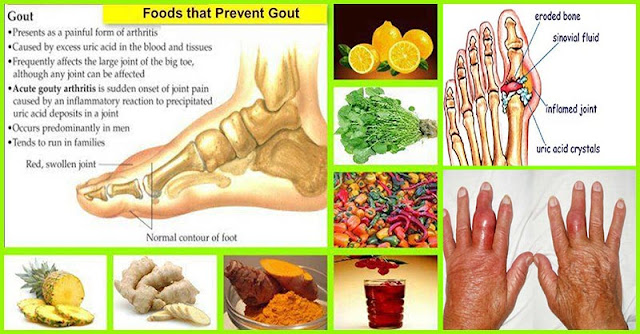Gout is probably the most painful form of arthritis. It is caused by hyperuricemia, a condition that is commonly described as an abnormally high level of uric acid in the blood. Causes of excess uric acid can be classified into 3 different functional types: increased production of uric acid in the body decreased excretion of uric acid through the kidneys and mixed type.
The most usual form of gout is a recurrent attack of acute inflammatory arthritis (a red, swollen joint). In 50 percent of the cases, the affected place is the metatarsal-phalangeal joint at the base of the big toe. Other joints such as heels, knees, wrists, and fingers can also be affected.
Continuous high levels of uric acid may result in other symptoms such as the formation of deposits of uric acid crystals known as tophi. If left untreated, tophi can develop and limit joint function and cause bone erosion. The excess uric acid in the blood can also lead to a creation of uric acid crystals in the kidneys, which firstly results in formation kidney stones, and then leads to a rapid decrease of kidney function (a condition known as acute uric acid nephropathy).
Normal uric acid levels are – For Men (3.4–7.0mg/dL), For Women (2.4–6.0 mg/dL)
Contributing Factors to a High Uric Acid Level:
1. Diet high in purines, which are broken down into uric acid
2. Excess consumption of alcohol beverages
3. Genetics
4. Insulin Resistance
5. Hypertension (high blood pressure)
6. Hypothyroidism ( a condition in which the thyroid gland does not produce enough thyroid hormone)
7. Obesity
8. Kidney failure
9. The use of diuretics
In some people, hyperuricemia is also caused due to enzyme defect which makes it difficult for the body to break down purines. Other causes include lead exposure and organ transplantation.
How to Control Uric Acid Levels?
- Avoid vegetables, fruits, and legumes rich in uric acid, as well as non-meat foods that have high purine content – Some of these foods include pineapples, kiwis, avocados, beans, peas, lentils, mushrooms.
- Avoid High-Fructose Corn Syrup – Don’t consume beverages and sweets that contain HFCS because it increases the uric acid in the blood.
- Avoid Fried and High Fat Foods – High intake of foods that are rich in saturated fat hinders the body to process uric acid.
- Eat A Low-Purine Diet – Purines are nitrogen-containing compounds that are most commonly found in animal proteins. Beer is also high in purine.
The Foods That Help Lower Uric Acid:
High-Fiber Foods – Whole grains, apples, pears, oranges, and strawberries can help lower uric acid in the body. You can also eat foods with starchy carbohydrates like brown rice, quinoa, oats, potatoes, and bananas because they contain small amounts of purine. Green Papaya Tea is another great option that prevents the accumulation of uric acid.
Water – Drinking plenty of water helps to dilute the uric acid and stimulates the kidneys to get rid of excess amounts through urine.
Apple Cider Vinegar – ACV is a known natural detoxifier that is helpful in removing waste from the body. Its high content of malic acid helps eliminate uric acid. Apple cider vinegar also has powerful anti-inflammatory and antioxidant properties. Add one teaspoon of raw, organic, unpasteurized apple cider vinegar to a glass of water and drink the mixture three times per day.
Lemon Juice – The high content of vitamin C in lemons helps to lower uric acid levels. Squeeze one lemon into a glass of warm and drink the juice every morning on an empty stomach.
Cherries, Blueberries, Blackberries – contain chemicals that can help reduce the high uric acid levels.
Baking Soda – Baking soda makes the uric acid more soluble and easier to remove from the kidneys. It also helps reduce gout pain and helps keep the alkaline balance in the body. Mix one teaspoon of baking soda in a glass of water and drink the mixture three times per day.
Choose Olive Oil and Coconut Oil instead of Vegetable Oils – Vegetable oils turn into rancid fats when heated. These fats destroy vitamin E in the body, which is crucial for the control of uric acid in the blood. On the other side, Olive Oil and Coconut Oil remain stable when heated. Additionally, they are also high in vitamin E and have powerful antioxidant and anti-inflammatory properties.









